Climate Governance in Ghana
Attachments

The CAT Climate Governance series seeks to produce a practical framework for assessing a government’s readiness - both from an institutional and governance point of view - to ratchet up climate policy and implement adequate transformational policies on the ground, to enable the required economy-wide transformation towards a zero emissions society.
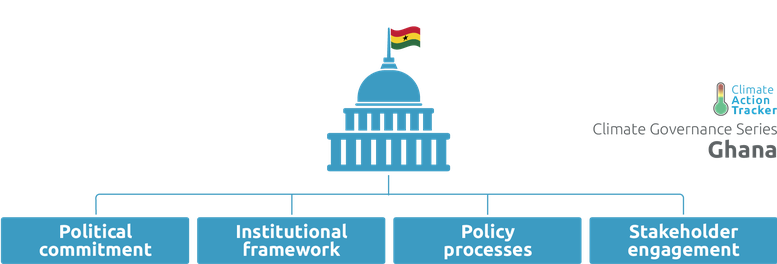
Our methodology
We have set up a framework that assesses and scores a number of indicators, where we rate various aspects of governance. This allows us to establish a common basis on which to compare climate governance across countries as well as identify areas of improvement and highlight positive developments. We have applied this framework at a national level only.
For the purpose and overview of this series, see our Climate Governance series main page. The methodology framework used for this assessment is here. For more detail on our methodology, see here: methodology page.
Assessment of national level readiness
Ghana’s president and his government are sending mixed messages – in that they are showing support for efforts to fight climate change, but at the same time also support fossil fuel extraction. Clear policy direction is important in efforts to drive the transition to a zero emissions society.
The two main political parties, in a de facto two-party system, recognise the need for climate action, although it is not a prominent topic for either of them. Ghana will hold presidential and parliamentary elections in 2024. The risks associated with a change in government appear to be more related to project implementation than policy direction as incoming administrations often put projects that were initiated by a previous administration on hold.
Structures for horizontal and vertical coordination on climate issues do exist but are not fully effective. While Ghana has the institutional structure in place to mobilise and manage climate finance, to date, the government has had difficulties in raising sufficient funds for climate action. The government institutions responsible for coordinating climate change action seem to receive sufficient budget to perform their statutory tasks, and their staff base seems stable. These institutions are therefore likely able to constantly build capacity and expertise.
Ghana has no long-term decarbonisation target nor strategy. Its low-carbon development strategy focuses on the period up to 2030. Ghana’s Renewable Energy Act provides the legislative framework for renewable energy development, but the country has no other climate-related legislation in place, and there is no evidence to suggest the government is committed to developing such legislation.
Ghana has submitted several GHG Inventory Reports to the UNFCCC, which is uncommon amongst developing nations and an indication that Ghana has sufficient human and financial resources to compile these reports.
While the structures for policy review are in place, they are not fully operational and effective. The government identified a need for technical support to improve its transparency and review mechanisms. Whether domestic climate action becomes progressively more ambitious can only be assessed once Ghana has published its revised NDC, currently under development.
The government goes to considerable effort to increase public awareness of climate change issues, but much work remains to be done, as only a fifth of the Ghanaian population is aware of climate change and its adverse impacts. While Ghana has no formal body nor procedure to ensure a Just Transition yet, the government recognises the need for a Just Transition as part of its climate policy development process. The government appears to be actively involving the private sector in the implementation of its climate policies.
Rating system
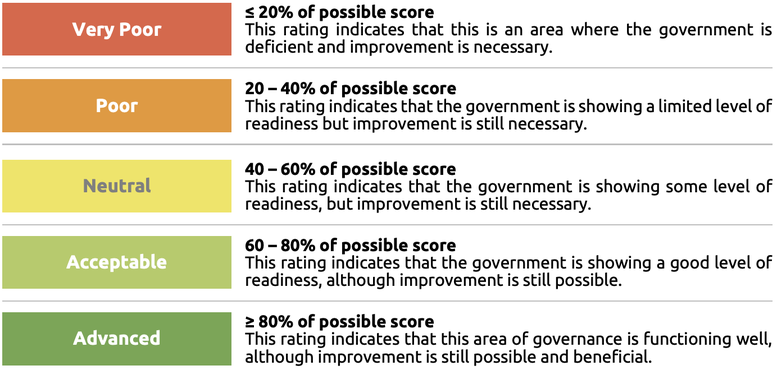
We analyse a number of different criteria of governance under four categories that cover the key enabling factors for effective climate action. We give each a rating as outlined above (very poor - poor - neutral - acceptable - advanced). The methodology framework used for this assessment is here. For more detail on our methodology in general, click the link below.
Ratings and Recommendations
The following section outlines the results of the analysis for each of the different categories and criteria as well as our recommendations for each category of governance.

- Strengthen the political commitment on climate mitigation – and the transition to a zero emissions society – at the highest government levels. Explicitly withdraw support for investments in and development of fossil fuel infrastructure.
- Anchor climate targets in law to increase the likelihood that future governments will continue to implement climate measures.

- Improve existing coordination mechanisms to ensure that climate mitigation – and the transition – are mainstreamed into all line ministries and local governments.
- Ensure that all line ministries align their policies with Ghana’s NDC target; and consider the transition to a zero emissions society in their policies.
- Identify barriers to accessing international climate funds and develop a plan to tackle them.

- Ensure all line ministries incorporate indicators to track NDC implementation in their Medium-Term Development Plans.
- Develop comprehensive climate change legislation that covers all economic sectors and enshrines emission reduction targets.
- Set a long-term 1.5°C-compatible emissions reduction target and develop policies to achieve this target.
- Ensure that all line ministries implement an MRV framework to track and report on progress on climate action.
- Relaunch the public G-CARP website, with data on GHG emissions in Ghana

- Scale up efforts to increase public awareness of climate change and the positive effects of mitigation action.
- Ensure a Just Transition for those working in the affected sectors, and for workers and communities that may be harmed by the transition to a zero emission society.
- Prepare and publish a strategy to involve the private sector in mitigation efforts, similar to the “Private sector engagement strategy for the National Adaptation Plan”.
Ghana's Climate Governance
These tables from the report give an overview and analysis of the key factors of Ghana's governance to enable effective climate action. We have looked at the country's key institutions, strategies, targets and legislation.
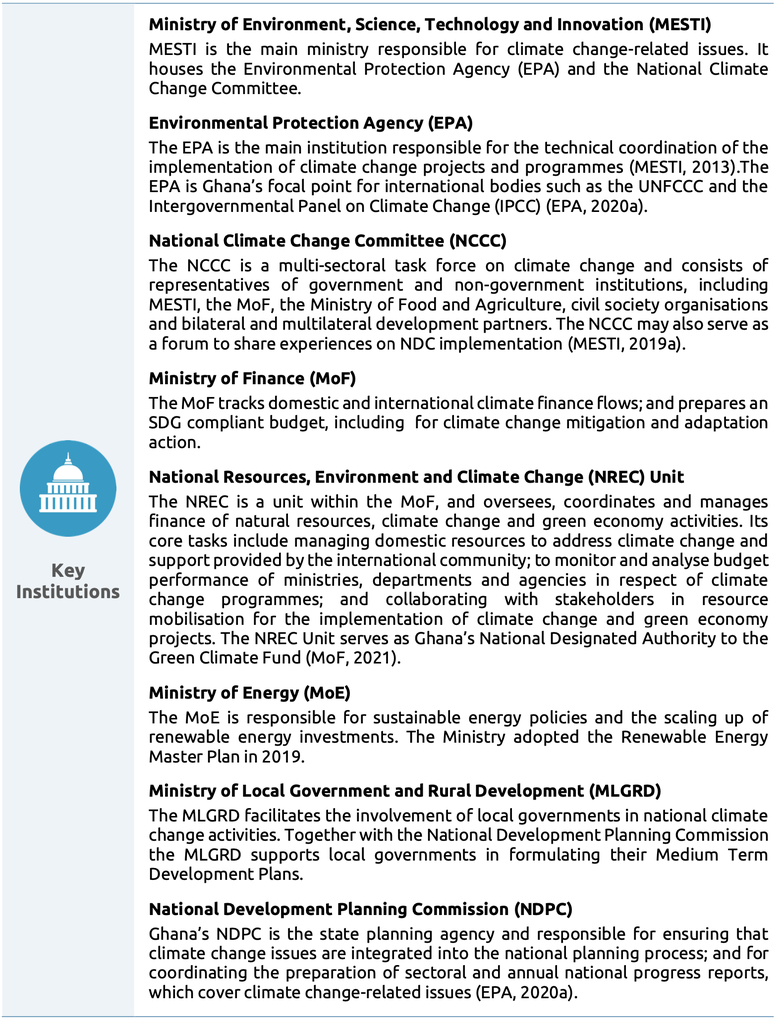
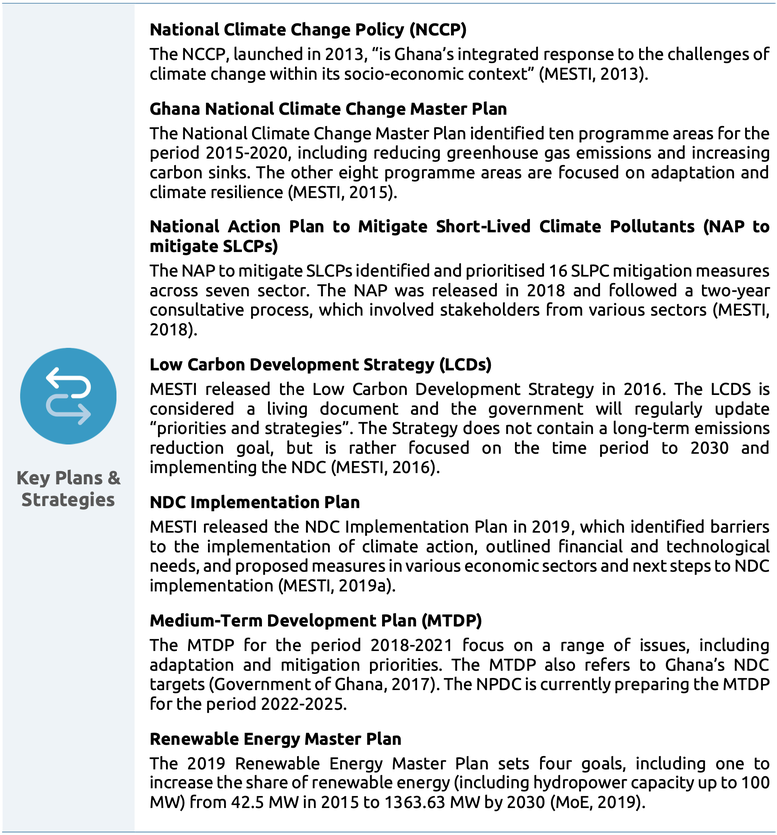
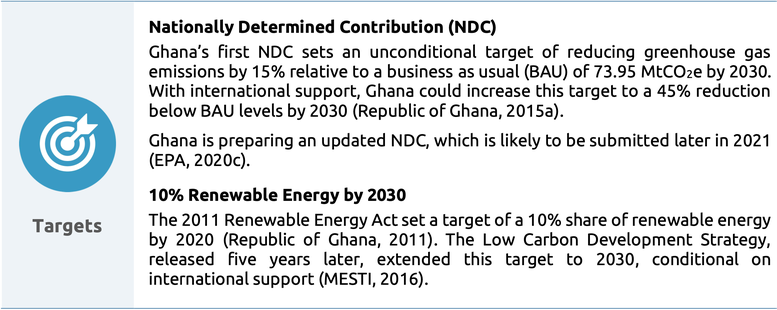

Stay informed
Subscribe to our newsletter